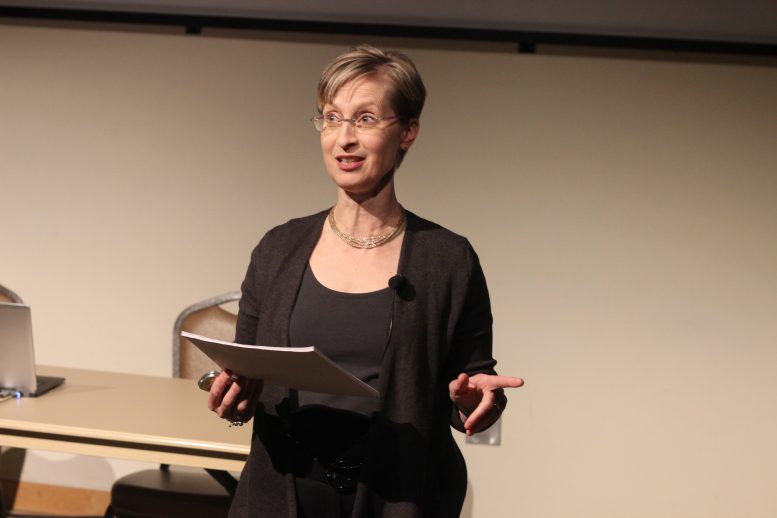By DAVID DUPONT
BG Independent News
Every year the Mortar Board honor society at Bowling Green State University selects a professor to deliver a “last lecture,” a speech to culminate the university experience.
The speaker should be an “accomplished professor” distinguished for scholarship, leadership and service. That’s what the email that Melissa Miller, professor in political science, received early one January morning said. She accepted the honor with little thought, or the assistance of her morning coffee. She was, she said, “putty in the hands” of Mortar Board.
It was only after some questions from her husband and political science department colleague Neal Englehart that the magnitude of the task at hand dawned on her – probably about the same time the sun dawned on her Perrysburg home.
He wondered: How long should lecture be? What is the lecture supposed to be about?
“I’ve got nothing,” Miller realized.
She related this dilemma to those attending her “last lecture” recently. “Nine Lives Later: What I Learned about How to Get Things Done” encapsulated what she would say if this was the last lecture she’d ever give.
In the end, Miller addressed this challenge the way she had so many others in her life and career dating back to her undergraduate years at Cornell University. Those challenges could be finishing her doctoral dissertation or making a Halloween costume for her 3-year-old. They occurred while competing on a college forensics team and climbing a mountain in Alaska.
“I always find a way,” she said. “I always come through. I have a pretty good grasp of how to get things done.”
When faced with daunting tasks, Miller explained in her lecture that she relies on three basic techniques – use what’s at hand; start the caffeine drip; and call a friend.
When she was on the speech team at Cornell she found herself competing in impromptu speaking for the first time. She failed miserably in her first attempt. Then her coach explained that all she needed was a list of topics, whether drawn from her studies of politics or her adolescent TV viewing, that she could talk about for 90 seconds. Doing this, she found success.
On the camping trip with her family, it was a soggy kid’s boot that proved to be the object at hand needed to accomplish the task at hand – flying the pack to keep the family’s food out of reach of bears.
On another outdoor adventure, she and her sister were climbing a peak in Mount Denali National Park in Alaska. Once they got above the tree line, Miller found herself panicking, “I suddenly had the distinct sensation that I was about to fall off. I was in no danger, but my stomach wasn’t buying it.”
She told her sister, who urged her to continue. “I’m going to throw up,” Miller said.
So they turned back. “It only got worse.”
They started scooching down. It was taking forever. So they decided to use what they had, their voices, and began to sing. They sang Paul Simon’s “Call Me Al,” with its tricky, surreal lyrics. So, distracted, the sisters made it down.
Starting the caffeine drip is Miller’s way of saying that when faced with a seemingly insurmountable task, if you put in the hours, assisted by caffeinated beverages, you can get the job done.
In the 1990s just out of grad school it was coffee from a Manhattan bagel shop that got her through the work at a political consulting agency that was a polling sweatshop employing half the people it needed. In 2007, it was tea from Starbucks that pulled her through a major research project on women in politics.
Dunkin’ Donuts was the source of the caffeine that helped her through another critical time. She was struggling to finish her dissertation at Northwestern University. She’d followed her husband as he began his career. The time dragged on, and she wasn’t making progress. Miller was contemplating not doing the dissertation, and instead taking the master’s degree as a kind of consolation prize.
So she called her mother. Would you be disappointed if I didn’t finish the dissertation?
Her mother responded: It didn’t matter if she would be disappointed, but would Miller would be disappointed?
Miller said she would be. “So you better sit down and start writing it,” her mother told her.
That story could just as well illustrate the final strategy as well, call a friend.
At Cornell, Miller was taking an astronomy course, and failing. Halfway through the semester she noticed from her seat in the rear, a sorority sister seated in the front row of the 500-seat auditorium. She decided to sit next to her.
The sorority sister’s advice was clear. Outline your notes, and memorize everything, even if you don’t understand it. From failing, Miller ended up with perfect scores on the last two exams.
She saw this play out as a professor. She was teaching Statistics and Research Methods, a favorite class of hers, and had a student, Gary, who just wasn’t getting it. Despite help over the summer from Miller, he ended up failing. He took the course again. It looked like he was headed in the same direction. Then a fraternity brother intervened. “This Alex had a real knack for statistics and research,” Miller said.
Gary rebounded, and passed. And on his final exam Alex described his work with Gary. It is still one of Miller’s favorite essay exam responses.
Then Miller told the story of the Halloween costume. She prides herself on making costumes for her two sons, using what’s at hand.
When the youngest was 3, she found a plush crown in a store. She was inspired. “I could build a whole costume around this,” she said. She did. Then on Halloween afternoon, she told her son to take a nap and when he got up he can put his king costume on.
“I don’t want to be a king, I want to be a vampire,” he told her.
She explained that she has a king costume, but not a vampire costume.
“I’m going to sleep real fast so I can be a vampire.”
Miller wonders how she missed this, and how does her 3-year-old know about vampires?
She discussed this dilemma with her husband. He assured her she can come up with a vampire costume.
“I demanded he help me.”
And by scrounging through the boys’ costume box, and Miller’s stock of fabric, they did it.
She called a friend, in this case her husband, used what was at hand, and maximized the time they had.
“These techniques are always handy,” she said. But they haven’t meant she’s reached all her dreams.
She did plan to serve in the U.S. Senate, but “I’m never going to run.” And she always wanted to be a Broadway diva. “But I have a teaspoon of talent and I need a truckload.”
She concluded: “Instead I am here at BGSU where I am privileged to teach amazing students. My far better and more achievable goal is to convince you to run for office, start a company, unravel DNA, start a grassroots movement or inspire your students to go out and change the world. The sky is the limit. With these simple techniques I’m convinced you too can go up in the clouds. And let me tell you, the view is pretty great.”


